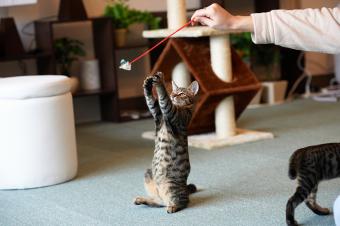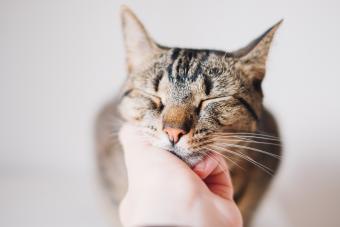
Some cats (like my cat, Lloyd) follow you around whenever you have a plate of food. Others wait until you leave the room and steal whatever's in the pot. While it can be obnoxious — and it's always worrying whether kitty might get into something toxic — there are some common reasons behind this behavior. Getting to the bottom of that can help you put a stop to these second suppers, keep your cat safer, and more accurately understand how much your cat is eating, an important part of their health.
Cats May Beg or Steal for Very Different Reasons
The first thing to keep in mind is that both medical and behavioral reasons can cause a cat to beg or steal, so a quick chat with your veterinarian is always a good idea to rule out a serious underlying issue that requires treatment. This is especially true if the begging and stealing are new behaviors. A sudden increase in hunger, which may cause your cat to beg or steal more incessantly, may be an indication of an underlying health issue.
1. Parasites Could Be the Cause
If you haven't checked your kitty for worms, it's time to do so. Worms can make your cat feel hungry all the time since the parasites are grabbing some of their nutrition. If your cat's suddenly started the behavior, your veterinarian will probably want to screen for intestinal parasites and run a blood panel for potential medical conditions.
2. Potential Health Conditions
Certain medical conditions, such as hyperthyroidism and diabetes, can cause an increase in your cat's appetite, which could cause them to beg or steal for extra food. Your veterinarian can help you rule these issues out or treat them early, which always offers the best outcome.
3. Instincts and Survival
Was your cat a stray in the past? Many former stray cats learn to hunt, beg, or steal for their meals. Even though your cat's now landed a cushy, well-fed home with you doesn't mean these lessons go away. Many former stray, now housecats will continue to forage and beg for food out of habit rather than necessity. It's fun, plus they might score a second supper!
4. Changes in the Environment
Environmental changes, like a change in their routine or a new pet, could cause them to appear hungry more frequently. In addition to being a canine behavior consultant, I have dipped my toes into the world of feline behavior. What I have learned is that if you have a new cat in the household, the dominant cat will eat out of the food dish more than the other. It's their way of saying, 'hey, this is mine.'
5. Your Kitty is Bored

It's possible that your cat is just plain bored. Have you ever noticed that you're more likely to snack when you're bored than when you're busy? It's the same with most kitties. In nature, animals spend significant portions of their time hunting and scavenging for food, so a bored cat could be looking to fill their time in this way.
6. Lacking in Nutrients
If your cat's diet isn't balanced or if their gut microbiome is off, they may sense the need to eat more to fill in those gaps. Certain nutritional deficiencies, like a lack of taurine, can be serious. Talk to your veterinarian about your cat's diet to make sure it's complete.
7. Unintentional Reinforcement
If you give up your food when your cat cries for it, you're actually encouraging the behavior — even though it's not on purpose. My kitty tends to beg because I have young kids who tend to drop food — a lot. So, when he's able to get his paws on a piece of chicken they dropped, he's going to do it again and again.
How to Stop Your Cat's Begging
To stop your cat's begging, you first need to take a look at the root cause. Figure out why your cat is begging and work with your veterinarian to rule out the medical possibilities. Keep in mind that many times an increase in appetite can be the only symptom you'll see, so don't rule medical out just because your cat seems otherwise healthy.
Ask the Vet About Parasites & Health Conditions
Your veterinarian can guide you if they detect worms or another issue going on with your cat. Remember, the sooner you have a diagnosis, the easier it will be to treat, so don't delay. Plus, things like worms can actually pass to people, so it'll help you keep your whole family healthier.
Teach Your Cat Survival Is Guaranteed
If your cat is begging because they're thinking they need to for survival (AKA instincts), you'll need to help train their mind to understand they don't have to eat any time they see food. They don't have to be opportunistic here. There's plenty of food, and it's not going anywhere. This is where something called counterconditioning comes to the rescue. Basically, counterconditioning helps reduce unwanted behavior by replacing it with another.
To help your cat understand they don't need to beg for food or try to stuff their face like a squirrel, sprinkle some treats around the house (away from their food dish and the kitchen). Not only will this help them understand that there's plenty of food to go around, but it will also provide them with some much-needed mental stimulation and physical activity.
Make Slow Changes to Their Environment
Make the process as easy as possible while your cat is getting accustomed to their new surroundings, routine, or new pet. If there's something new in your cat's life, it's important to continue giving them the same amount of attention (or perhaps more) as before. It's also important to introduce change slowly rather than hitting them with it all at once if you can do so.
For example, if you adopt a new cat, restrict the new cat to a certain area of the house that your resident cat doesn't visit often. Then, your resident cat may feel less threatened by the newcomer's arrival. The same goes for a new routine. Introducing the new routine slowly, if you can, could help your cat get accustomed to the new schedule. According to Best Friends Animal Society, "problems usually arise from progressing too quickly and not taking small enough steps, so take care to always be aware of your cat’s comfort level."
Relieve the Boredom
Find some activities for your cat to do — train your cat to walk on leash, grab a window perch, build an outdoor catio, play with cat grass options, or grab one of these other fun ideas for enriching your cat's environment.

Check Your Cat's Diet for a Nutrient Deficiency
Check out your cat's diet to determine if their nutrition is balanced well. KittyBiome may also help your veterinarian or nutritionist gain an understanding of what nutrients need to be added and how far off your cat's gut microbiome is from normal.
Don't Reinforce the Behavior
Don't give your cat scraps, regardless of how much they beg. If you don't pay attention to the begging, they will stop associating begging with receiving food scraps or treats.
Manage Temptation
Finally, do all you can to avoid reinforcement of the behavior by managing access and temptation. Be sure to put away foods, or wrap them in foil so your cat's less likely to snack and steal.
Remain Observant
There are reasons why your cat is begging or stealing food. You just have to remain observant and move through the list using the process of elimination. Some cats will be super obvious about what the problem is, whereas others may take a little more detective work. Either way, knowing you can manage the behavior should give you a sigh of relief.







